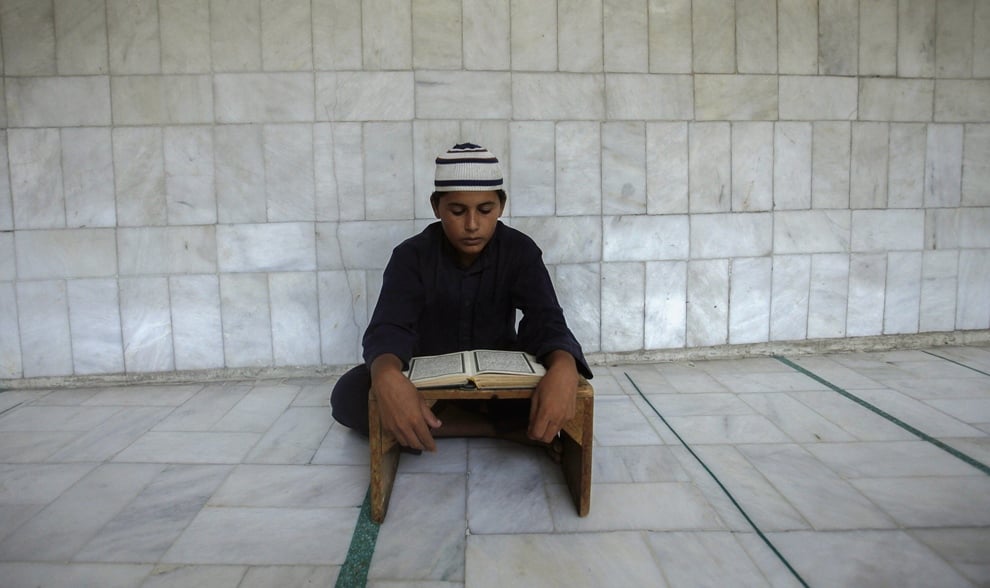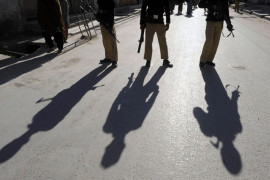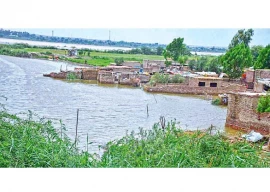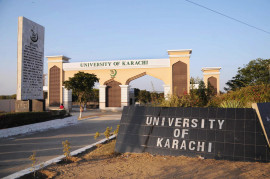
When it comes to offering an antidote to the country's grueling problems, the members of Youth Parliament Pakistan seem to be one step ahead of their seasoned counterparts in the country's parliament.
Over the past few months, while politicians across the country kept themselves embroiled in pro- and anti-dharna politics, the Youth Parliament's 10-member standing committee on education and youth affairs held brainstorming sessions, carried out painstaking research and met policy experts, including politicians, bureaucrats, academics and researchers.
In addressing the issue of growing extremism in the context of over 20,000-odd madrassas in the country, the young members of the model parliament, which is patterned after the National Assembly of Pakistan, have issued a thorough report, titled Madrassa Education: Challenges, Reforms and Possibilities, that was prepared between June and August and finally published around two weeks before the Peshawar school carnage.
As a result, they were able to propose a well-rounded strategy to amend the Pakistani madrassa education system, which is often generalised as a breeding ground for terrorists.
The report
The report highlights that between 20,000 to 30,000 seminaries are operating in the country and claim association with five seminary boards based on mainstream schools of thought or sects, including Wifaqul Madaris al Arabia (Deobandi), Tanzimul Madaris (Barelvi), Wifaqul Madaris al Salafia (Ahle Hadith), Rabitaul Madaris al Islamia (Jamaat-e-Islami) and Wifaqul Madaris al Shia (Ahle Tashi).
Registration
"The government should own and give heed to religious [educational] institutions as they do in the case of public and private schools," demands the report. It suggests a stringent mechanism of supervision and registration where monitoring teams within federal and provincial bodies should maintain a record of the existing and newly constructed seminaries.
Administration
The report suggests that existing madrassa boards be given the status of independent examination boards. They should, however, be affiliated with the education or religious affairs ministries so as to connect them to the mainstream education system.
Citing the example of madrassa education system in Indonesia that is under the responsibility of the religious affairs ministry, the report adds that seminaries in Indonesia were formally integrated into the national education system to follow the national curriculum and education standards set by the government.
Under this arrangement, all madrassas in Pakistan will be required to submit an annual report of their educational activities as well as the audit report of their accounts.
Funding
The seminaries work as non-government organisations and get their finances through charity and zakat, animal hide collection, philanthropists and overseas Pakistanis. However, the problem is linked with what the report terms 'controversial' sources of funding. These include foreign donors that help foster the sectarian divide as well as various political and religious groups that make massive investments in these seminaries for their own vested interests.
The report calls for sufficient allocation for seminaries in the national education budget with special emphasis on avoiding the funds from Western donors that may generate mistrust. "Sufficient government funding can help these institutions function without resorting to questionable means of sustaining themselves," adds the report.
Curriculum
On curriculum content, the report blames the unmonitored seminary boards that influence the young minds with manipulated curriculum.
It demands the government to compile a national curriculum for madrassas to discourage hate material while aiming to induce critical and analytical thinking in the students as well as improve their employability.
For this reason, the report emphasises that the education being imparted in madrassas must not be limited to religious scripts. There is a need to form a balanced and unified syllabus that includes both religious as well as scientific knowledge to pursue higher education or vocational training for the acquisition of skills to earn livelihood.
A democratic approach
Since its inception in 2007 by the Pakistan Institute of Legislative Development and Transparency (PILDAT), the Youth Parliament, as part of a learning process, has been tasked with conducting reviews of national policies through research-based analysis and with developing policy alternatives for the parliament and the Government of Pakistan.
"We try to raise our voice and share our findings and analyses on various regional, national and international issues," Mizghan Kirmani, chairperson for the Youth Parliament's standing committee on education and youth affairs told The Express Tribune. "Regrettably, the parliamentarians hardly give attention to our findings or perhaps they think our democratic exercise is not worthy of their attention."
Published in The Express Tribune, December 26th, 2014.
1731907834-0/Jonathan-Majors-and-Meagan-Good-(2)1731907834-0-405x300.webp)
1731906859-0/Jonathan-Majors-and-Meagan-Good-(1)1731906859-0-165x106.webp)

1724657897-0/Untitled-design-(2)1724657897-0-165x106.webp)













COMMENTS
Comments are moderated and generally will be posted if they are on-topic and not abusive.
For more information, please see our Comments FAQ